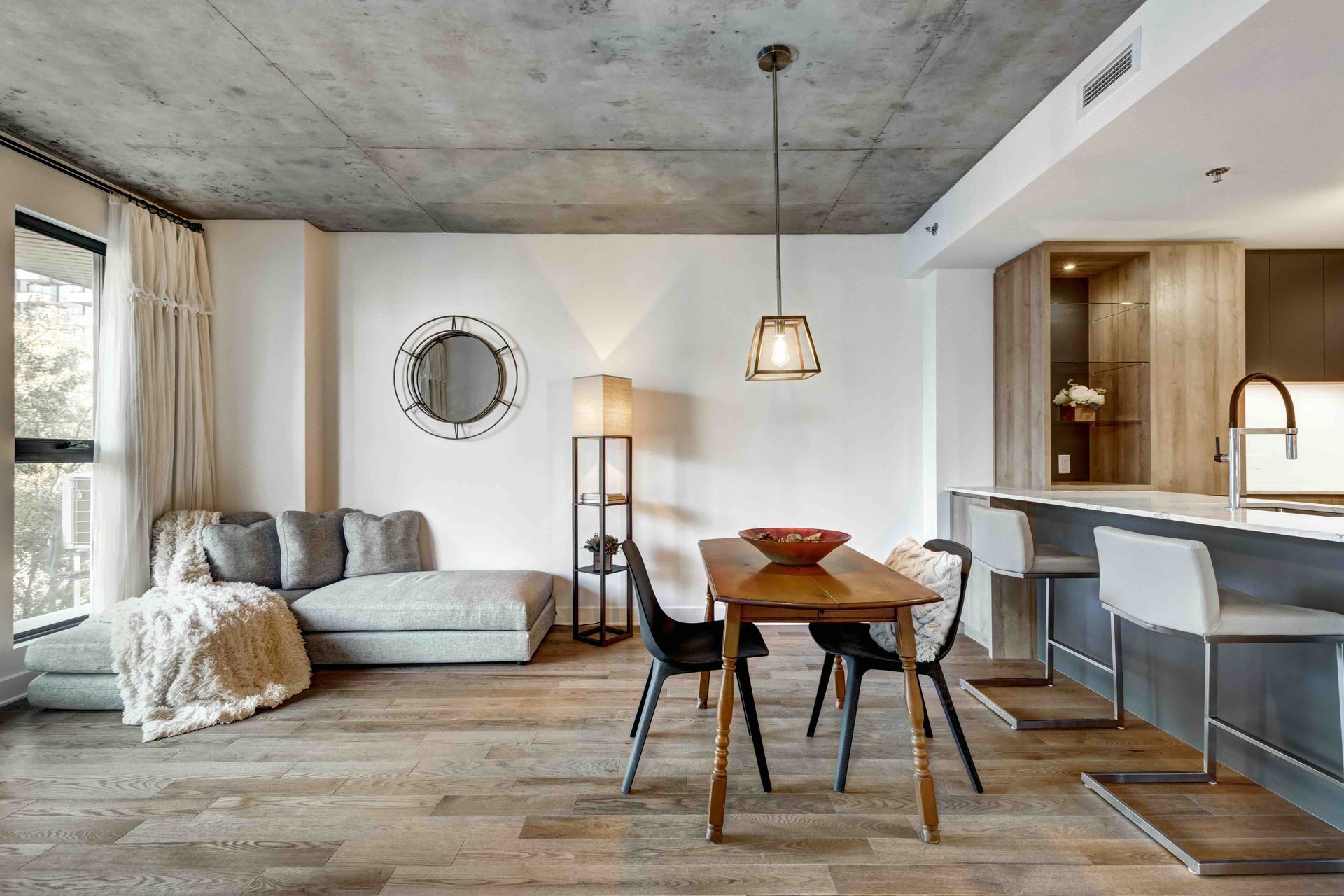327 W. Main Street, Suite 2, PO Box 65 Ionia, MI 48846
CALL US TODAY 616.522.6006
Preparing Your Home for Showings: A Seller's Checklist
What sets your home apart from the others? Preparing your home for showings may seem daunting, but it's also an exciting opportunity to showcase its best features. The real estate market can be bustling with competition, but fear not! Even in this seller's market, there's plenty you can do to ensure your home stands out and sells quickly.
Keeping your home in tip-top shape for every show is critical to winning over those potential buyers. Think of it like nurturing a beautiful garden: you've planted the seeds, but now it's all about daily care and attention to ensure it blooms into something truly spectacular.
With a little effort and attention to detail, you can make your home irresistible to potential buyers. These helpful tips for presenting your home will be your secret weapon whenever a realtor schedules a showing, bringing you one step closer to finding the perfect buyer with a smile!
Contact Your Trusted Real Estate Agent
Get excited about taking the first step towards selling your home by contacting your real estate agent! Don't wait until you're ready to list—the sooner you team up with a real estate agent, the better the outcome. Trust this: early collaboration often leads to quicker sales and more cash in your pocket when all is said and done.
Real estate agents are experts in today's market trends and can craft a personalized plan to make your property shine. Plus, they've got an extensive network of top-notch contractors, vendors, and service professionals ready to treat you like a VIP. Say goodbye to stress because, with their support, you'll breeze through the prep work in no time.
Provide Renovations and Pre-listing Inspections
Let's ensure your home is ready to dazzle potential buyers when it hits the market! While significant renovations might not be necessary, giving your older home a little TLC or addressing any lingering doubts about its condition is essential.
Consider a pre-listing inspection as your secret weapon against future surprises. While it's not always the norm in a seller's market, this proactive step can save you headaches. During your initial meeting with your chosen agent, you'll weigh the pros and cons to ensure you're making the best decision for your home.
Now's the perfect time to tackle any looming structural, systems-related, or cosmetic issues. From pesky frame or foundation concerns to outdated design features, we'll work together to ensure your home shines bright and captures buyers' hearts. Let's turn any potential stumbling blocks into selling points and set the stage for a seamless sales journey!
Checklist: Before Listing Your Home for Showings
Preparing your home for showings can feel overwhelming. It's a good thing that there are simple yet joyful tips to help you showcase your space in its best light. With these simple steps, you'll have your home shining brightly and ready to impress every time a realtor calls to arrange a showing.
Prepare the Front Door
Picture this: Your front door is the show's star! It sets the tone for what's to come, and we want it to dazzle potential buyers from the get-go. A fresh coat of paint, a little polish for the handles, or even a modern upgrade can work wonders, transforming your home's entrance into a beacon of beauty. And why stop there? Add some extra flair with a vibrant wreath or a snazzy new welcome mat, welcoming everyone with open arms and a touch of warmth.
Depersonalize
Create a welcoming atmosphere by depersonalizing your home. Say goodbye to those family photos on the mantel and any personal touches that make it uniquely yours. It's time to make room for everyone to envision themselves living happily in this beautiful space.
Declutter
Next up, let's declutter like there's no tomorrow! Clear out those plastic totes and bins cluttering your storage areas to reveal the hidden gems. Pack away anything you're not using and consider storing it off-site until after the move. Aim for spacious, open rooms, inviting potential buyers to imagine their lives unfolding here.
Deep Clean
Roll up your sleeves and dive into a deep cleaning frenzy! From top to bottom, every surface deserves attention. Don't forget the windows, curtains, carpets, and baseboards—leave no corner untouched! And if the thought of tackling it all yourself is daunting, why not consider bringing in the professionals? It's a small investment that could save you time and stress in the long run.
Redesign
Sprinkle some simple redesign magic into your home and leave your buyers swooning. Let's start with a splash of color—a fresh coat of paint can work wonders and won't break the bank. Fun fact: it can give you a whopping 107% return on your investment! Stick to warm, neutral tones for that universally appealing vibe. Don't forget about curb appeal—it's like love at first sight for potential buyers! Spruce up your exterior with fresh sod, vibrant flowers, and a touch of new mulch. Trust us, homes with irresistible curb appeal sell for a juicy 7% more on average.
Home Showings Checklist
Once you've laid the groundwork, it's time to keep that momentum by making sure your home is always show-ready and primed to steal the spotlight! Let's keep things sparkling and inviting with these simple daily tasks to ensure your home is always show-ready. So, roll up your sleeves and dive into the ongoing home maintenance and presentation journey with this simple checklist:
Conceal Daily Clutter
Don’t overlook and declutter like a boss! Keep a handy container in each room to stash away daily messes quickly. From hairbrushes to office junk, these hideouts will save the day.
Refrain from Showing Pets
Making other arrangements for pets helps keep surprises to a minimum and accommodates potential purchasers who may have allergies. Banishing any pesky odors, especially from our furry friends, is a top priority. Hide those pet supplies out of sight and ensure your beloved pets are out for a walk during showings.
Wash the Dishes
Let’s tackle those dishes, too! Keep that sink shining by running the dishwasher every night and putting away the clean dishes each morning. No dishes left behind—have those countertops gleaming!
Clean Countertops
When kitchen and bathroom countertops are clutter-free, they feel spacious and organized, highlighting their functionality. Give your countertops a wipe-down every morning to impress potential buyers with your kitchen and bathroom sparkle. Keep some handy disposable wipes nearby for a quick clean-up.
Wash the Laundry
Finally, keep that laundry under control! Tackle at least one load daily, fold, and promptly put away clothes. No stray socks or piles of laundry in sight when potential buyers come knocking!

Checklist: The Day of the Home Showings
Selling your home is an adventure filled with emotions, but trust that the journey is worth it! You'll find it incredibly rewarding with the right approach and a little guidance. Let's make those last-minute cleaning sessions a breeze by staying on top of daily tasks. When you get the call for a showing, whip out this handy checklist and tackle those tasks like a pro.
Provide Essential Information
Arm potential buyers with all the essential and necessary information. Property brochures highlighting your home's features and recent upgrades will leave a lasting impression. Sharing your average monthly utility bills is a genius move to show off your home's efficiency and transparency.
Secure Personal Belongings
Things of personal value should be kept in a safe place. This guarantees the environment is safe and depersonalizes it at the same time. Invest in a locked file cabinet to keep your valuables safe and sound during every showing.
Vacuum the Floors
Start your day by quickly sweeping or vacuuming those floors. Whether you've got wood, linoleum, or carpet, a daily once-over will keep them looking their best.
Clean the Sink
Don't forget about the sinks! A simple wipe-down will keep them sparkling and add to the overall appeal of your home.
Fix the Beds
Bedrooms are like cozy retreats! Picture plush, neutral bedding—it's like wrapping yourself in a cloud of relaxation and luxury. And when it comes to furniture, think about arranging it like a pro. Make your beds each morning for that hotel room chic vibe in your bedrooms. Symmetrical and open walkways are the secret ingredients to making your bedroom feel super organized and spacious.
Wipe the Mirrors
Keeping things tidy is vital, especially when showing off your home! Shining windows aren't just about seeing clearly—they let that gorgeous natural light pour in, making everything feel bright and breezy. Give your mirrors some love, too—a quick wipe with window cleaner will keep them gleaming and add a touch of shine to your space.
Choose the Right Lighting
Securing the proper home lighting is the magic ingredient that sets the mood in your home. Different types of bulbs can change how a room feels. Think warm and soft lighting: it's like a big, cozy hug for your space, making it feel super inviting. Don't forget to utilize your home's natural light: nature's energy booster! So, when it's sunny outside, throw those blinds and curtains wide open. Not only does it make your rooms feel more connected to the outdoors, but it also makes them look bigger and brighter.
Add Final Touches
Before you head out, add those final touches that make all the difference. Toilet seats down, comforters smoothed, doors open, and the perfect temperature set. Soft music and fresh flowers add charm, making your home feel like a welcoming oasis.


Want to buy or sell property?
Call us today
Quick Links
Properties
Agents
Quick Links
Properties
Agents
Contact Info

327 W. Main Street, Suite 2, PO Box 65 Ionia, MI 48846

Monday-Sunday (By Appointment)
- Licensed REALTORS® & Real Estate BROKERS®
- Members of the National Association of REALTORS®
- Members of the Michigan Association of REALTORS®
- Members of the Greater Regional Alliance of REALTORS®
Riverside Realty is a Christian-based company that was born in 2017, when James Buxton and Aimee Knudson were introduced to each other through a mutual friend, as both were looking to make changes in their individual real estate careers.
website by SPECK DESIGNS




